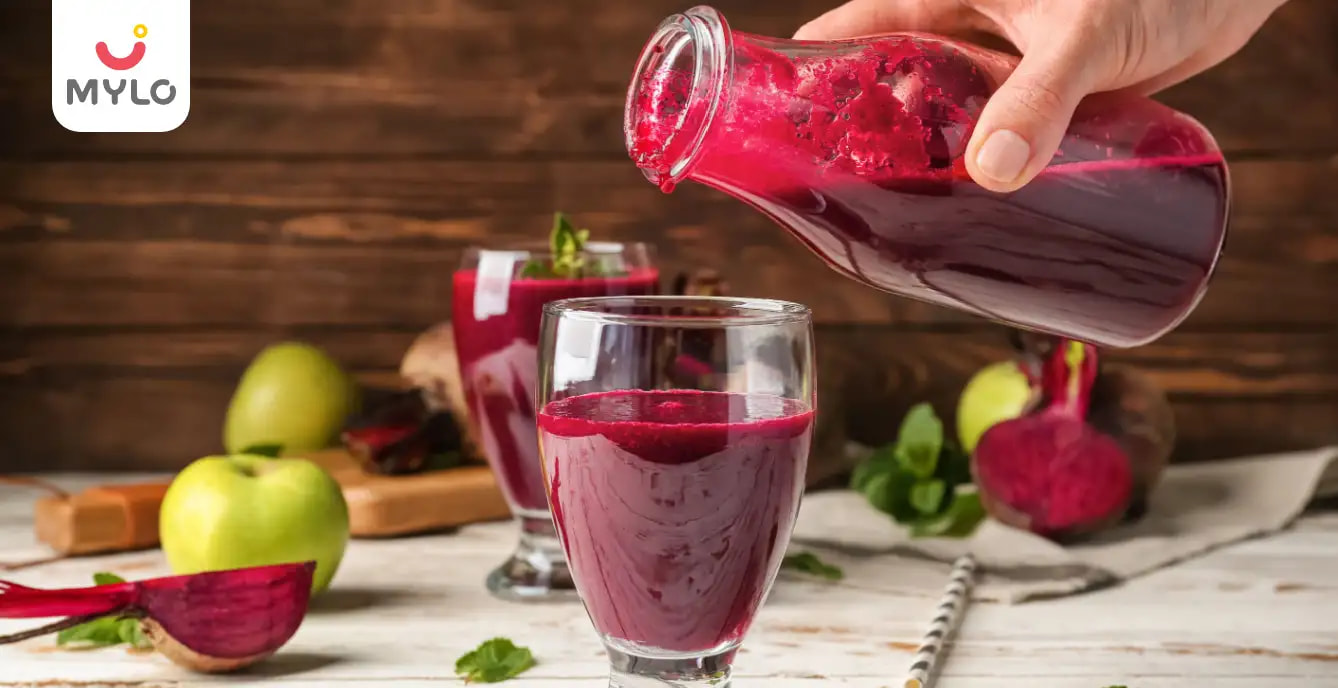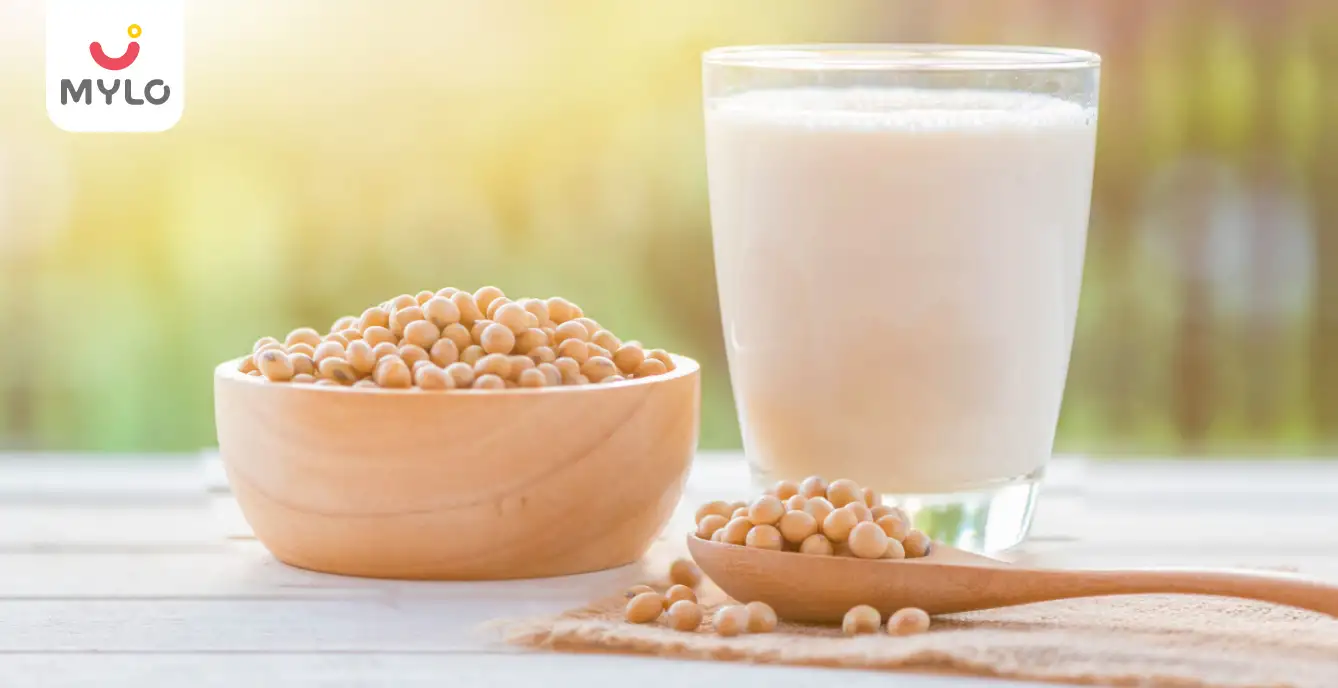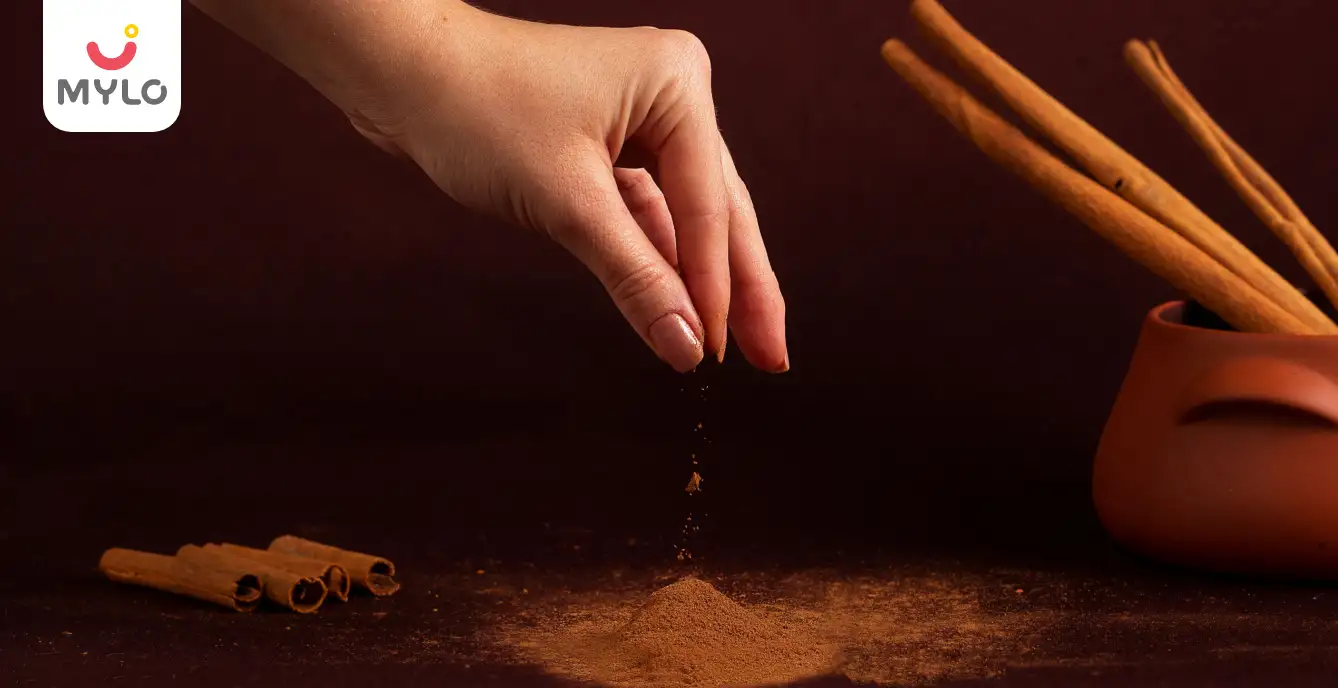Get MYLO APP
Install Mylo app Now and unlock new features
💰 Extra 20% OFF on 1st purchase
🥗 Get Diet Chart for your little one
📈 Track your baby’s growth
👩⚕️ Get daily tips

OR


Article Continues below advertisement
- Home

- PCOS & PCOD

- Beetroot for PCOS: Discovering a Natural Approach to Managing Symptoms
In this Article
- Is beetroot good for PCOS?
- What are some common beetroot benefits for PCOS?
- 1. Regulating Hormonal Imbalances
- 2. Improving Insulin Sensitivity
- 3. Supporting Liver Detoxification
- 4. Boosting Digestive Health
- 5. Enhancing Energy Levels
- How to incorporate beetroot in your daily diet?
- 1. Beetroot Salad
- 2. Beetroot Smoothie
- 3. Roasted Beetroot
- 4. Beetroot Hummus
- 5. Beetroot Juice
- Tips to keep in mind while consuming beetroot for PCOS
- 1. Moderation is Key
- 2. Monitor Blood Sugar Levels
- 3. Consider Your Digestive System
- 4. Choose Organic and Fresh
- 5. Diversify Your Diet
- FAQs
- 1. What is the link between beetroot and PCOS?
- 2. Is beetroot juice good for PCOS?
- Final thoughts

PCOS & PCOD
Beetroot for PCOS: Discovering a Natural Approach to Managing Symptoms
Updated on 21 September 2023



Medically Reviewed by
Dr. Shruti Tanwar
C-section & gynae problems - MBBS| MS (OBS & Gynae)
View Profile

Polycystic Ovary Syndrome (PCOS) affects millions of women worldwide, causing a wide range of symptoms like irregular periods, hormonal imbalances, and fertility issues. While medication and lifestyle changes are typically recommended, an increasing number of women are turning to natural remedies to alleviate their PCOS symptoms. Among these, beetroot for PCOS has emerged as a powerful ally.
In this article, we will explore the relationship between beetroot and PCOS, delve into the incredible benefits of beetroot and explore how it can positively impact women with PCOS.
Is beetroot good for PCOS?
Beetroot is a root vegetable known for its vibrant red color and numerous health benefits. It is rich in essential nutrients, including vitamins A, C, and K, as well as minerals like potassium, magnesium, and iron. Additionally, beetroot contains a high concentration of antioxidants, particularly betalains, which have anti-inflammatory and detoxifying properties. These nutrients and antioxidants make beetroot a valuable addition to the diet of women with PCOS.
Article continues below advertisment
You may also like : Soy for PCOS: Should You Eat it or Avoid It?
What are some common beetroot benefits for PCOS?
Let us now discover the benefits beetroot has to offer to women with PCOS:
1. Regulating Hormonal Imbalances
PCOS is often associated with hormonal imbalances, particularly elevated levels of androgens. Studies have shown that beetroot can help regulate hormone levels, including reducing excess androgens. This can lead to improved menstrual regularity and reduced symptoms associated with PCOS.
2. Improving Insulin Sensitivity
Insulin resistance is a common feature of PCOS, contributing to weight gain and difficulty in managing blood sugar levels. Beetroot contains nitrate compounds that can enhance insulin sensitivity, helping to stabilize blood sugar levels and potentially aiding weight management for women with PCOS.
3. Supporting Liver Detoxification
The liver plays a crucial role in hormone metabolism and detoxification. Beetroot contains antioxidants and phytonutrients that support liver function, promoting efficient detoxification of hormones and reducing their build-up in the body. This can contribute to a healthier hormonal balance in women with PCOS.
Article continues below advertisment
4. Boosting Digestive Health
Women with PCOS often experience digestive issues, such as bloating and constipation. Beetroot is rich in dietary fiber, which aids digestion and promotes regular bowel movements. By including beetroot in their diet, women with PCOS can support a healthy digestive system and alleviate these uncomfortable symptoms.
5. Enhancing Energy Levels
Fatigue and low energy levels are common complaints among women with PCOS. Beetroot contains nitrates that can improve blood flow and oxygen delivery to the muscles, enhancing energy levels and reducing fatigue. Adding beetroot to the diet can provide a natural energy boost for women with PCOS.
You may also like : Cinnamon for PCOS: Discovering the Natural Support You've Been Missing
How to incorporate beetroot in your daily diet?
Now that you understand the benefits of beetroot for PCOS, the next step is to find creative ways to incorporate this nutritious vegetable into your daily diet. Here are five suggestions to help you get started:
1. Beetroot Salad
Create a refreshing salad by combining grated or thinly sliced beetroot with leafy greens, such as spinach or arugula. Add a sprinkle of feta cheese and a drizzle of olive oil and lemon juice for a delicious and nutritious meal.
Article continues below advertisment
2. Beetroot Smoothie
Blend cooked beetroot with your choice of fruits, such as berries or bananas, and a liquid of your choice, such as almond milk or coconut water. This vibrant smoothie can be a great way to start your day or enjoy as a midday snack.
3. Roasted Beetroot
Slice beetroot into thin rounds or wedges, toss with olive oil, and roast in the oven until tender. You can season them with herbs and spices of your choice, such as rosemary or cumin, for added flavor.
4. Beetroot Hummus
Add a twist to your regular hummus recipe by incorporating cooked beetroot. Simply blend cooked chickpeas, beetroot, tahini, lemon juice, garlic, and olive oil until smooth. Enjoy it as a dip or spread on whole grain toast.
5. Beetroot Juice
If you prefer a quick and easy option, beetroot juice can be a convenient way to consume this nutritious vegetable. Juice fresh beetroot with other fruits or vegetables of your choice, such as carrots or apples, for a refreshing and nutrient-packed beverage.
You may also like : PCOS Tests: The Power of Diagnostic Tests in Your Health Journey
Article continues below advertisment
Tips to keep in mind while consuming beetroot for PCOS
While incorporating beetroot into your diet can be beneficial for managing PCOS symptoms, it's important to keep a few tips in mind:
1. Moderation is Key
While beetroot is nutritious, it should be consumed in moderation. Excessive intake can lead to an increase in sugar levels and may not be suitable for everyone, especially those with certain medical conditions. Consult with a healthcare professional or nutritionist to determine the appropriate amount for your specific needs.
2. Monitor Blood Sugar Levels
If you have PCOS and are at risk of or have diabetes, monitor your blood sugar levels closely when consuming beetroot. Although beetroot can enhance insulin sensitivity, individual responses may vary. It's always best to be aware of how your body reacts to different foods.
3. Consider Your Digestive System
While beetroot is a valuable source of dietary fiber, it may not be suitable for everyone, especially those with digestive conditions like irritable bowel syndrome (IBS). If you experience any digestive discomfort after consuming beetroot, consult with a healthcare professional.
4. Choose Organic and Fresh
When purchasing beetroot, opt for organic varieties to minimize exposure to pesticides and other chemicals. Choose fresh beetroot that is firm, smooth, and vibrant in color. Avoid wilted or damaged beetroot, as they may have lost some of their nutritional value.
Article continues below advertisment
5. Diversify Your Diet
While beetroot can be a beneficial addition to your diet, it's essential to maintain a balanced and varied approach. Incorporate other nutrient-dense foods, such as fruits, vegetables, whole grains, lean proteins, and healthy fats, to ensure you're getting a wide range of essential nutrients.
You may like : PCOS Food List: Your Guide to Eating Smart with PCOS
FAQs
1. What is the link between beetroot and PCOS?
Beetroot contains essential nutrients, antioxidants, and phytonutrients that can support hormonal balance, improve insulin sensitivity, aid liver detoxification, enhance digestion, and boost energy levels.
2. Is beetroot juice good for PCOS?
Beetroot juice is a convenient and popular way to consume this nutritious vegetable. However, it's important to note that beetroot juice is higher in sugar content compared to whole beetroot. Consider diluting the juice with water or combining it with other vegetables to reduce the sugar impact.
Article continues below advertisment
Final thoughts
Consuming beetroot for PCOS can be a natural and beneficial approach to managing symptoms of PCOS. Its nutrient-rich composition and various health benefits make it a valuable addition to the diet of women with PCOS. However, it's essential to remember that dietary changes alone may not completely resolve PCOS. Consult with a healthcare professional or nutritionist to develop a comprehensive plan that includes lifestyle modifications, exercise, and other appropriate treatments to effectively manage your PCOS symptoms.
References
1. Shahid R, Iahtisham-Ul-Haq, Mahnoor, Awan KA, Iqbal MJ, Munir H, Saeed I. (2022). Diet and lifestyle modifications for effective management of polycystic ovarian syndrome (PCOS). J Food Biochem.
2. Farshchi H, Rane A, Love A, Kennedy RL. (2007). Diet and nutrition in polycystic ovary syndrome (PCOS): pointers for nutritional management. J Obstet Gynaecol.
Article continues below advertisment





Medically Reviewed by
Dr. Shruti Tanwar
C-section & gynae problems - MBBS| MS (OBS & Gynae)
View Profile


Written by
Anandita Sharma
Drawing on more than a decade of expertise in administration, Anandita Sharma currently serves as a content operations e
Read MoreGet baby's diet chart, and growth tips

Related Articles
Related Questions
Hello frnds..still no pain...doctor said head fix nhi hua hai..bt vagina me pain hai aur back pain bhi... anyone having same issues??
718 views
Kon kon c chije aisi hai jo pregnancy mei gas acidity jalan karti hain... Koi btayega plz bcz mujhe aksar khane ke baad hi samagh aata hai ki is chij se gas acidity jalan ho gyi hai. Please share your knowledge
727 views
I am 13 week pregnancy. Anyone having Storione-xt tablet. It better to have morning or night ???
730 views
Hlo to be moms....i hv a query...in my 9.5 wk i feel body joint pain like in ankle, knee, wrist, shoulder, toes....pain intensity is high...i cnt sleep....what should i do pls help....cn i cosult my doc.
733 views
Influenza and boostrix injection kisiko laga hai kya 8 month pregnancy me and q lagta hai ye plz reply me
743 views
RECENTLY PUBLISHED ARTICLES
our most recent articles

PCOS & PCOD
Soy for PCOS: Should You Eat it or Avoid It?

PCOS & PCOD
Cinnamon for PCOS: Discovering the Natural Support You've Been Missing

Motor Skills
When Do Babies Start Walking?

Second Trimester
The Ultimate Guide to 4th Month Pregnancy Symptoms

Pregnancy Journey
Your Guide to 2 Months Pregnant Symptoms: What to Expect

Nutrition Tips
The Ultimate Balanced Diet Chart: Your Guide to Optimal Nutrition
- Mundan Ceremony: A New Parent's Guide to Customs, Traditions and Celebrations
- Dates for PCOS: How to Harness their Health Benefits
- Coconut Water for PCOS: Discovering the Natural Support You've Been Missing
- Everything You Need to Know About the Length of Vagina
- Herbs for Male Fertility: Exploring Herbal Solutions for Male Reproductive Health
- Is Banana Good for PCOS: A Comprehensive Guide to Understanding Their Relationship
- Flax Seeds for PCOS: How This Superfood Can Improve Symptoms
- Shankhpushpi: Discover the Health Benefits of This Ancient Herb
- Chamomile: The Ultimate Guide to Discovering its Medicinal Properties and Health Benefits
- Endometrial Thickness in Pregnancy: Your Guide to Understanding What is Normal
- Hypomenorrhea: When Your Period is Lighter Than Usual
- Anti Mullerian Hormone Test: The Key to Early Detection of Fertility Issues
- Benefits of HSG Test: The Secret to Boosting Your Chances of Getting Pregnant
- Deviry Tablet Uses: How to Maximize The Benefits for Your Reproductive Health


AWARDS AND RECOGNITION

Mylo wins Forbes D2C Disruptor award

Mylo wins The Economic Times Promising Brands 2022
AS SEEN IN
















- Mylo Care: Effective and science-backed personal care and wellness solutions for a joyful you.
- Mylo Baby: Science-backed, gentle and effective personal care & hygiene range for your little one.
- Mylo Community: Trusted and empathetic community of 10mn+ parents and experts.
Product Categories
baby carrier | baby soap | baby wipes | stretch marks cream | baby cream | baby shampoo | baby massage oil | baby hair oil | stretch marks oil | baby body wash | baby powder | baby lotion | diaper rash cream | newborn diapers | teether | baby kajal | baby diapers | cloth diapers |





